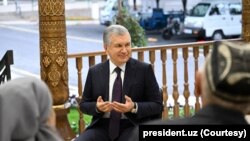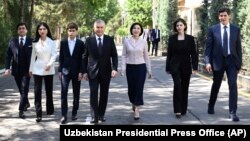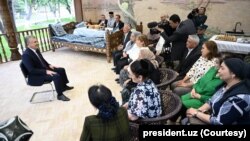Uzbek President Shavkat Mirziyoyev has announced snap elections less than a week after securing public approval for a new constitution that opens the door for him to extend his time in office by more than a decade.
Mirziyoyev cast the decision as a reform-minded move and a personal sacrifice.
"Why am I voluntarily giving up the remaining three and a half years of my presidential term?" asked the president, who is nearing the mid-point of his final five-year term under the old constitution. Under the new constitution, he is eligible for two more seven-year terms.
"First, all the branches of government are being reformed," Mirziyoyev said in a May 8 televised address. "Our people expect us to make significant and urgent changes in all areas."
Mirziyoyev, who is unlikely to face any serious obstacles in seeking reelection, said the point of the new basic law is to introduce a separation of powers and checks and balances. "After all, our basic law stipulates that the people are the sole source of state power," he said. "We will never deviate from the path of reforms."
The Uzbek president has also vowed that the coming elections "will be held in full accordance with the law, openly and transparently" and that "the political parties and presidential candidates will put forward new ideas and initiatives to serve the peace and prosperity of the country."
Critics point to the findings of international election observers, such as the Organization for Security and Cooperation in Europe (OSCE), which has never found any vote in Uzbekistan to be free or fair. The OSCE's initial assessment of the April 30 referendum listed several flaws, including the absence of political competition, pluralism, debate or balanced media coverage.
Mirziyoyev reiterated that journalists are "the most effective force in conveying the voice and opinion of the people" but included the caveat that "freedom of expression means responsibility. Therefore, we must remember that the main requirements for activities in the information space are reliability and objectivity."
He also pledged to foster civil society in order to ease social-economic problems and promote human rights and freedom. "We will resolutely continue on the path of democratic development," Mirziyoyev said. "My biggest dream is to create a truly democratic system in which the mahalla [grassroots community] solves people's problems independently."
But such pledges are hard to sell to a public long accustomed to viewing presidential speeches as long on rhetoric and short on substance.
Bloggers, who under Mirziyoyev's rule have emerged as Uzbekistan's most important social and political commentators, are increasingly skeptical about his intentions. They fear that anything written or stated that is critical of the president or his family can become the basis for prosecution on charges of defamation or related crimes.
Uzbekistan has increased penalties in recent years for statements "threatening the president."
'Back to repression'
In a series of interviews with VOA, reporters and bloggers said that while Uzbekistan is freer than under the previous leader, "iron-fisted" Islam Karimov, the last few years under Mirziyoyev have witnessed a tightening of the space for free expression.
Whereas in 2017-2019, the initial years of Mirziyoyev's presidency, there was a sense of momentum around reforms and a loosening of censorship, they describe the current conditions as "back to repression" and "fearful and disappointing."
In an interview with VOA, Uzbekistan's new ambassador to the United States, Furqat Sidikov, said that despite many challenges, the reforms continue.
"We mean it when we say we have a policy of openness. Uzbekistan is open for engagement and business within and abroad. We have a strong will to move forward as a nation, political system, economy," he said.
Sidikov insisted that any changes, including the constitutional amendments and domestic and foreign policy decisions, are undertaken in the best interests of the country.
But Timur Karpov, a Tashkent-based human rights defender and photographer, remains unconvinced, saying the Mirziyoyev administration suffers from a fundamental lack of credibility.
Karpov, whose 139 Documentary Center showcases "real life and untold stories in Uzbekistan," questioned official reports that nearly 85% of eligible voters took part in the referendum and that more than 90% approved of the new constitution.
"I do understand everyone who didn't participate because our generation has never had a practice of trusting the government," he said.
Karpov said he does not yet see the "New Uzbekistan" that Mirziyoyev has been promoting. "We hear in the news that there are reforms, but we don't feel them."
Comparison to Kazakh leader
Yevgeniy Zhovtis, a human rights lawyer in neighboring Kazakhstan, compared Mirziyoyev's reform agenda with that of Kazakh President Kassym-Jomart Tokayev, who also claims that his country is being reshaped under his leadership.
The two governments' reforms are mainly "rhetorical," Zhovtis said, noting that neither country has yet replaced its Soviet-era-type of law enforcement agencies, judiciary or dominant security services.
He admitted that changing such institutions is difficult, especially amid internal power struggles and geopolitical challenges. But he sees the two leaders as "afraid to move forward" for fear of destabilizing the system they are accustomed to.
"You cannot meet the public demand" or ensure social and judicial justice simply by modernizing abusive state bodies and vertical power structures, Zhovtis argued. "These institutions are replicating themselves, and those coming in, including the ones educated in the West, end up learning the same rules of the game."
He stressed that all the countries in Central Asia are still run by consolidated autocracies despite claims of reform and progress from previous and current leaders.
Following nationwide anti-government protests and violence that killed at least 238 people in early 2022, Tokayev initiated constitutional amendments, changed the presidential term, held snap elections, and got re-elected for a new seven-year term.
But long-awaited parliamentary elections this year, which many saw as an opportunity for Tokayev to introduce more pluralism, did not open the space for genuine political opposition.
Uzbekistan is now going through a similar cycle, stirring worries that Mirziyoyev's makeovers will not lead to the rule of law that he promises.
Nevertheless, Pamela Spratlen, the former U.S. ambassador to Uzbekistan, remains optimistic.
"I'm not ready to write off reforms in either country. Certainly, the snap elections, consolidation of power and muzzling of dissent are worrisome trends in Kazakhstan and Uzbekistan. But I don't think either president wants to be considered a copy of his predecessor," she told VOA.
While ambassador in Tashkent, Spratlen witnessed the Uzbek leadership transition in 2016 and the launch of reforms in 2017-2018. Previously, she had served as the U.S. ambassador in Kyrgyzstan and deputy chief of mission in Kazakhstan.
"Let's see what Mirziyoyev and Tokayev do with their power in a world that presents each of them with many internal and external challenges. Let's see what the United States does to sustain its role as a reliable partner at a time of change among major powers," she said.
Washington supports the reform agendas in Uzbekistan and Kazakhstan, urging Mirziyoyev and Tokayev to meet their peoples' expectations.
Talking with Uzbek media last month, U.S. Ambassador in Tashkent Jonathan Henick expressed hope that the new constitution will lead to systemic progress.
"Ultimately, we believe that in a democracy, people need to be able to have a choice of their leaders. … That's what we support," Henick said.

















